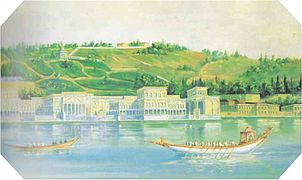Çırağan Palace
The Sultan Suite, billed at US$35,419.68 per night, is ranked number 14 on World's 15 most expensive hotel suites compiled by CNN Go in 2012.
History
The palace, built by Sultan Abdulaziz to replace the old Çırağan Palace which was at the same location, was designed by the Armenian palace architect Nigoğayos Balyan and constructed by his sons Sarkis and Hagop Balyan between 1863 and 1867, during a period in which all Ottoman sultans built their own palaces rather than using those of their ancestors; Çırağan Palace is the last example of this tradition. The inner walls and the roof were made of wood, the outer walls of colorful marble. A beautiful marble bridge connects the palace to the Yıldız Palace on the hill behind. A very high garden wall protects the palace from the outer world.
The construction and the interior decoration of the palace continued until 1872. Sultan Abdulaziz did not live long in his magnificent palace - he was found dead inside on 30 May 1876, shortly after he was dethroned. His successor, his nephew Sultan Murad V, moved into Çırağan Palace, but reigned for only 93 days. He was deposed by his brother Abdul Hamid II due to alleged mental illness and lived there under house arrest until his death on 29 August 1904.
On November 14, 1909, during the Second Constitutional Monarchy, Sultan Mehmed V allowed the Ottoman Parliament to hold their meetings in this building. Only two months later, on January 19, 1910, a great fire destroyed the palace, leaving only the outer walls intact. Called "Şeref Stadı", for many years its garden served as a football field for the club Beşiktaş J.K.
In 1987, the ruined palace was bought by a Japanese corporation, which restored the palace and added a modern hotel complex next to it in its garden. The modern hotel building was opened in 1990 and the restored palace building was opened in 1992.
Today, Çırağan Palace operates as a luxurious extension of the five-star Kempinski hotel, featuring elegant suites, two fine dining restaurants, and a traditional Turkish hammam for guests to enjoy. The Palace was renovated again during the first quarter of 2007, now resembling the authentic palace with the baroque style and soft colors.
-
The old Çırağan Palace in 1840, which was replaced by the current one in 1863–1867
-
Çırağan Palace was damaged by fire in 1910
-
View of the gate from Bosphorus
-
Side view from Bosphorus
-
Atrium with staircase inside Çırağan Palace
-
Atrium Hall inside Çırağan Palace
-
Yıldız Arc at Çırağan Avenue
See also
References
- ^ Arnold, Helen [1] CNN Go. 25 March 2012. Retrieved 2014-10-09
- ^ "History of the Palace". Kempinski. Retrieved 14 November 2024.
- ^ "A Luxurious Journey to Istanbul". bestluxuryhotels.co. Retrieved 14 November 2024.
Literature
- Çelik Gülersoy. The Çerâğan palaces. Istanbul Kitaplığı, Istanbul (1992). ISBN 975-7687-08-1
External links
![]() Media related to Çırağan Palace at Wikimedia Commons
Media related to Çırağan Palace at Wikimedia Commons







